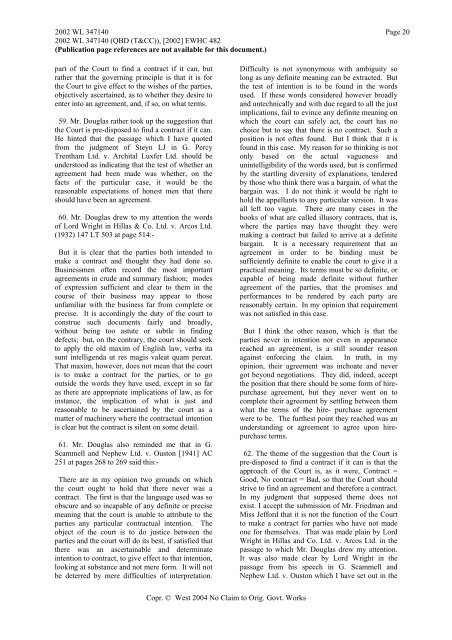Tesco v Constain - Thomson Reuters
Tesco v Constain - Thomson Reuters
Tesco v Constain - Thomson Reuters
You also want an ePaper? Increase the reach of your titles
YUMPU automatically turns print PDFs into web optimized ePapers that Google loves.
2002 WL 347140 Page 202002 WL 347140 (QBD (T&CC)), [2002] EWHC 482(Publication page references are not available for this document.)part of the Court to find a contract if it can, butrather that the governing principle is that it is forthe Court to give effect to the wishes of the parties,objectively ascertained, as to whether they desire toenter into an agreement, and, if so, on what terms.59. Mr. Douglas rather took up the suggestion thatthe Court is pre-disposed to find a contract if it can.He hinted that the passage which I have quotedfrom the judgment of Steyn LJ in G. PercyTrentham Ltd. v. Archital Luxfer Ltd. should beunderstood as indicating that the test of whether anagreement had been made was whether, on thefacts of the particular case, it would be thereasonable expectations of honest men that thereshould have been an agreement.60. Mr. Douglas drew to my attention the wordsof Lord Wright in Hillas & Co. Ltd. v. Arcos Ltd.(1932) 147 LT 503 at page 514:-But it is clear that the parties both intended tomake a contract and thought they had done so.Businessmen often record the most importantagreements in crude and summary fashion; modesof expression sufficient and clear to them in thecourse of their business may appear to thoseunfamiliar with the business far from complete orprecise. It is accordingly the duty of the court toconstrue such documents fairly and broadly,without being too astute or subtle in findingdefects; but, on the contrary, the court should seekto apply the old maxim of English law, verba itasunt intelligenda ut res magis valeat quam pereat.That maxim, however, does not mean that the courtis to make a contract for the parties, or to gooutside the words they have used, except in so faras there are appropriate implications of law, as forinstance, the implication of what is just andreasonable to be ascertained by the court as amatter of machinery where the contractual intentionis clear but the contract is silent on some detail.61. Mr. Douglas also reminded me that in G.Scammell and Nephew Ltd. v. Ouston [1941] AC251 at pages 268 to 269 said this:-There are in my opinion two grounds on whichthe court ought to hold that there never was acontract. The first is that the language used was soobscure and so incapable of any definite or precisemeaning that the court is unable to attribute to theparties any particular contractual intention. Theobject of the court is to do justice between theparties and the court will do its best, if satisfied thatthere was an ascertainable and determinateintention to contract, to give effect to that intention,looking at substance and not mere form. It will notbe deterred by mere difficulties of interpretation.Difficulty is not synonymous with ambiguity solong as any definite meaning can be extracted. Butthe test of intention is to be found in the wordsused. If these words considered however broadlyand untechnically and with due regard to all the justimplications, fail to evince any definite meaning onwhich the court can safely act, the court has nochoice but to say that there is no contract. Such aposition is not often found. But I think that it isfound in this case. My reason for so thinking is notonly based on the actual vagueness andunintelligibility of the words used, but is confirmedby the startling diversity of explanations, tenderedby those who think there was a bargain, of what thebargain was. I do not think it would be right tohold the appellants to any particular version. It wasall left too vague. There are many cases in thebooks of what are called illusory contracts, that is,where the parties may have thought they weremaking a contract but failed to arrive at a definitebargain. It is a necessary requirement that anagreement in order to be binding must besufficiently definite to enable the court to give it apractical meaning. Its terms must be so definite, orcapable of being made definite without furtheragreement of the parties, that the promises andperformances to be rendered by each party arereasonably certain. In my opinion that requirementwas not satisfied in this case.But I think the other reason, which is that theparties never in intention nor even in appearancereached an agreement, is a still sounder reasonagainst enforcing the claim. In truth, in myopinion, their agreement was inchoate and nevergot beyond negotiations. They did, indeed, acceptthe position that there should be some form of hirepurchaseagreement, but they never went on tocomplete their agreement by settling between themwhat the terms of the hire- purchase agreementwere to be. The furthest point they reached was anunderstanding or agreement to agree upon hirepurchaseterms.62. The theme of the suggestion that the Court ispre-disposed to find a contract if it can is that theapproach of the Court is, as it were, Contract =Good, No contract = Bad, so that the Court shouldstrive to find an agreement and therefore a contract.In my judgment that supposed theme does notexist. I accept the submission of Mr. Friedman andMiss Jefford that it is not the function of the Courtto make a contract for parties who have not madeone for themselves. That was made plain by LordWright in Hillas and Co. Ltd. v. Arcos Ltd. in thepassage to which Mr. Douglas drew my attention.It was also made clear by Lord Wright in thepassage from his speech in G. Scammell andNephew Ltd. v. Ouston which I have set out in theCopr. © West 2004 No Claim to Orig. Govt. Works
















